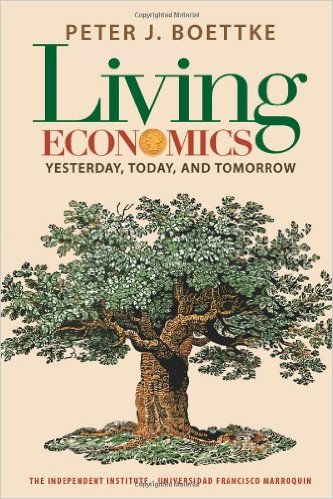Peter Boettke is an economist out of George Mason University and he specializes in the history of economic thought and institutional economics. Boettke was lucky enough to study under many notable economists, such as James Buchanan, Israel Kirzner, Gordon Tullock, and Don Lavoie. For his book Living Economics, Boettke takes a different approach than others by creating a story out of economic history. In this lovely little book, Boettke takes you down economic history lane with an Austrian twist, recounting major players in economics from both the left and right and guiding you through what he believes economics is all about. In Living Economics, Professor Boettke describes the profession of economics truly, as if it were alive.
Why I chose it
Peter Boettke teaches at George Mason University, a school I have immense respect for and hope to one day attend. Living Economics is a book meant for aspiring graduate students, and while I am far from that, I still believed I would enjoy it.
Summary
Boettke’s book is broken into four sections, but you can read the book in any order. Within Living Economics is multiple lessons on fundamental ideas in the free market tradition, and tales from various professors, Boettke himself included. Within each section are different lessons and different people, a tactic by Boettke that keeps the book fresh and interesting as you go from chapter to chapter. Living Economics communicates to scholars within the field of economics and reinvigorates you with inspiration from other economists, their stories, and with guidance from Boettke himself.
Within Living Economics, you (re)discover the Smithian tradition of economic thought (the combination of political economy and limited intervention), new institutional economics (with an emphasis on Elinor Ostrom), public choice economics (from Tullock and Gordon), entrepreneurial economics by Kirzner and Schumpeter, the failure of socialism as told by Hayek and Mises, and multiple other economists in the tradition of Smith and the Austrian school. All of this occurs in part II of Living Economics, “On Teachers of Economics,” and it by far takes up the majority of the book. While always emphasizing free markets, Boettke’s book throws a wide net of historical analysis and manages to stay interesting and informational all throughout this section.
With part I of Boettke’s book, you learn more about teaching economics, or why and how you should teach it. Boettke argues that explaining economics to the population at large remains one of the most critical, and underachieved, responsibilities of economists. Explaining the market mechanism, why it works, why it fails, and how we should react are all things economists should actively strive to teach the citizens of the public in order to ensure prosperity takes root and lasts in a country. By obvious extension, Boettke also argues that as teachers to be, economists should emphasize the success of free markets to their students in class, rather than focusing on the few major exceptions like most text books do now. At the end of the day, Professor Boettke looks at teaching as one of the most honorable professions, and bias aside, I believe he makes a good argument for why it is.
Finally, with Part III of Living Economics, Boettke focuses on where mainstream economics has gone wrong. In this section, Boettke introduces more thinkers, especially on the left, and analyzes how and why their theorems, rather than ‘theories,’ became fact in orthodox economics. Economists such as Leon Walras, Oskar Lange, Joseph Stiglitz, and Maynard Keynes come into play much more in this section as Boettke explains, and promptly criticizes, the rise of neoclassical economics and its equilibrium models, neo-Keynesian economics, and the Chicago school as well. Austrian economics, and its various methodologies and theories, holds place as the most consistent school of economics to Boettke, and he blames mainstream thought as the reason why economists have shifted roles from ‘lowly philosophers’ to ‘high priests.’ Rather than act as cautious advisors to economic thought, economists now act as masters of reality, able to create models and concrete theorems that can predict and explain human behavior.
Boettke’s book did have fourth part, but this section is only six pages long and serves only as a summation of the book.
Criticism
Overall, I loved Boettke’s work in Living Economics. My only real criticism is that his writing is sometimes too much ‘stream of thought,’ an approach that leaves you rereading some passages from the book. The book is heavily slanted towards Austrian thought, but this is a matter of opinion, and I feel should not be an issue given the very nature of the book.
Conclusion
It may be because I have read much more serious texts for the past two months, but Boettke’s book is serious enough to learn substantially from while remaining a lighter read for anyone interested in economic history and the profession itself. While I sat down and grinded through Living Economics, you could easily pick up and drop the book over a large period of time and still not be confused because of how Boettke organized his writing. I really appreciated everything I learned from Living Economics, and I am sure that in three years’ time, when I begin my journey into graduate school, I will be picking up Boettke’s book to read again. 4/5.

This was a fantastic article regarding the book “Living Economics”, one that I really enjoyed. I especially liked the concise way in which it conveyed all the information required succinctly. I’m a 15 year old with a blog on finance and economics at shreysfinanceblog.com. It would be very much appreciated if you could read and reblog one of my articles! Thanks again for this great article.